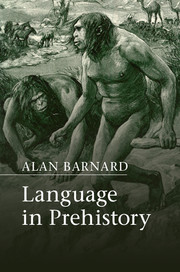Book contents
- Frontmatter
- Dedication
- Contents
- List of figures
- List of tables
- Preface
- 1 Introduction
- 2 Population diversity and language diversity
- 3 What did prehistoric people do?
- 4 How did prehistoric people think?
- 5 Narratives of the every-day
- 6 Mythological narratives
- 7 Sexual selection and language evolution
- 8 Conclusions and thoughts for the future
- Glossary
- References
- Index
6 - Mythological narratives
Published online by Cambridge University Press: 05 November 2015
- Frontmatter
- Dedication
- Contents
- List of figures
- List of tables
- Preface
- 1 Introduction
- 2 Population diversity and language diversity
- 3 What did prehistoric people do?
- 4 How did prehistoric people think?
- 5 Narratives of the every-day
- 6 Mythological narratives
- 7 Sexual selection and language evolution
- 8 Conclusions and thoughts for the future
- Glossary
- References
- Index
Summary
According to the great scholar of ancient mythology, G. S. Kirk (1970: 8), ‘For the Greeks muthos just meant a tale, or something one uttered, in a wide range of senses: a statement, a story, the plot of a play.’ What in southern Africa are usually assumed to be myths, as opposed to some other sort of narrative, have a similar definition: no distinction is made between them and any other kind of story. Plato was among the first to use the term myth in writing. For him too, muthologia simply referred to the ‘telling of stories’ (Kirk 1970: 8). And Kirk (1970: 280–5) ends his exploration of the functions of myth with a brief assessment of theories of origin. He stresses the dynamism of mythology and the gradual evolution of narrative structures. Kirk, in fact, sees the acquisition of symbolic meaning almost as incidental. He also points to the diversity of forms of meaning in myth, and for the Ancient Greeks this seems to have been characteristic of the genre.
My own view is not entirely dissimilar, except that I disagree with Kirk's emphasis on the diversity of mythologies. Like Lévi-Strauss (e.g., 1978), I prefer to see the unity of meaning across the continents, even where the elements of narrative and the stories themselves differ in specifics. Kirk discusses Lévi-Strauss's structural approach at some length, but Kirk's concern is more with myth in literate contexts, including myth in ancient Mesopotamia, Greece and India. Lévi-Strauss always saw myth quite differently, not only as a property of pre-literate culture but also one property among three others: mathematical entities, music and natural language.
Languages are said to be ‘embodied’ where sound and sense intersect. Music is ‘language without meaning’ and ‘myth is overloaded with meaning’, producing ‘structural patterns coded in images’ (Tilly 1990: 45–6). Music and myth are ‘by-products of a structural shift which had language as its starting point’ (Lévi-Strauss 1981 [1971]: 647). In other words, from language, all else emerges. It is telling that language is Lévi-Strauss's starting point, and indeed that it is in the four volumes of his great work, the Mythologiques, that his fame rests. Yet it is not necessarily literally true that language was invented before myth, or indeed that language preceded music.
- Type
- Chapter
- Information
- Language in Prehistory , pp. 92 - 106Publisher: Cambridge University PressPrint publication year: 2016



